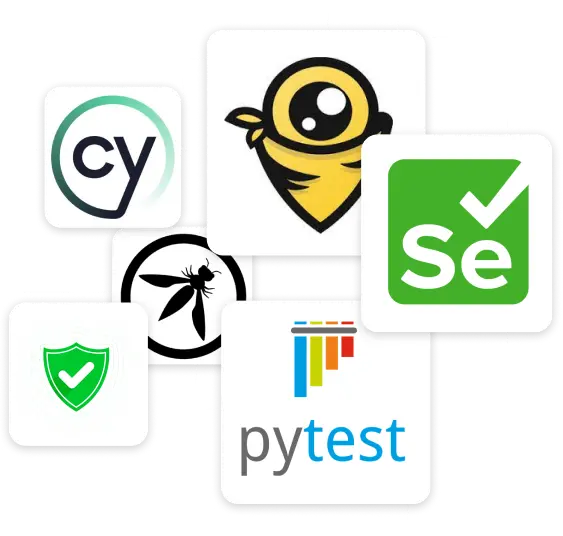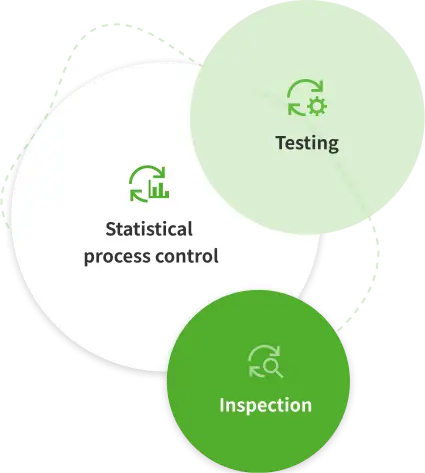


Quality assurance
In manufacturing, QA is super important to make sure products meet the right specs and keep customers happy. Get ready for quality control with us.


What Is Quality Assurance?
Have you ever experienced the disappointment of purchasing a product only to discover that it didn't live up to its advertised claims?
This unfortunate scenario creates a lasting negative impression, making it highly unlikely for you to consider buying from that specific brand again. The reason for this loss of trust lies in the negligence or lack of proper quality assurance measures.
Quality assurance is about ensuring a product or service meets the requirements. It's like a system that sets the standards for making reliable stuff.

Importance of Quality Assurance
Why do we need it, you ask? Well, we are ready to answer that question for you:
Customer satisfaction:
QA ensures that customers receive reliable and high-quality products, building trust and loyalty.
Cost savings:
QA identifies and rectifies issues early, preventing expensive rework or customer complaints down the line.
Brand reputation:
QA safeguards a company's reputation by maintaining consistent excellence and avoiding costly recalls or negative reviews.
Compliance adherence:
QA ensures adherence to industry regulations and standards, mitigating legal and financial risks.

Quality assurance methods and standards
Effective QA methods serve as the gatekeepers of flawless software. These methods include:

Testing:
Quality Assurance testing services involve subjecting the product or service to various tests to ensure that it meets the established standards of quality, reliability, and performance.
Inspection:
Inspection involves examining the product or service to identify defects or errors. This method is commonly used in manufacturing industries.
Statistical process control:
Statistical process control involves monitoring the production process to identify any deviations from the established quality standards.
But it doesn't stop there. By adhering to industry-recognized standards such as ISO 9001 and CMMI, organizations demonstrate their unwavering commitment to quality. These standards serve as beacons of trust, assuring customers that their software solutions are crafted with meticulous attention to detail and adhere to the highest industry benchmarks.

Pros and Cons of QA


Improved product quality:
Website Quality Assurance helps identify and fix bugs, glitches, and usability issues, resulting in a polished and reliable product.
Enhanced user experience:
Thorough QA testing ensures a smooth and seamless user experience, leading to higher satisfaction and increased user engagement.
Reduced risks:
QA mitigates the risks of critical errors or failures, protecting your brand reputation and customer trust.
Time-consuming:
QA testing can be time-intensive, as it involves comprehensive analysis, bug fixing, and retesting, potentially extending the development timeline.
Increased costs:
Implementing QA requires additional resources, including skilled testers, testing tools, and infrastructure, which can add to the overall project costs.

Quality Assurance in Software
Software Quality Assurance (SQA) involves validating processes, procedures, and standards to ensure their suitability and correct implementation throughout the project.
To implement effective SQA, several key activities should be considered. First, develop a comprehensive SQA Management Plan to outline the approach and evaluate the skills of the SQA team.
Checkpoints can evaluate project performance and identify any deviations from quality standards. Adopting multiple Quality Assurance software testing strategies is recommended to ensure thorough software testing and minimize reliance on a single approach.
Additionally, measuring the impact of changes made to address errors is crucial, as it helps assess potential risks and compatibility with the overall project.



Service Assurance (SA)

Service assurance (SA) plays a crucial role in optimizing performance and providing guidance for managing communication networks, media services, and end-user applications.
This comprehensive approach revolves around the notion that by enhancing customer experience and maximizing satisfaction, long-term profitability can be achieved.
Service assurance includes software Quality Assurance services (QA), quality control (QC), and service-level management (SLM). SLM involves keeping an eye on and managing the key performance indicators ( KPIs) of a product or service, using cool technologies like the Internet of Things (IoT), machine learning, open-source software, and artificial intelligence.
Why companies love working with us
When seeking a dependable partner for your company's testing requirements, it's crucial to choose a team that not only understands your business and technical needs but also delivers top-notch results. That's why companies love working with us.
Our Quality Assurance services go beyond the ordinary, as we meticulously analyze project documentation to ensure a comprehensive understanding of your needs.

We specialize in web and mobile testing, creating relevant and detailed test cases, checklists, and bug reports. Moreover, we excel in integration and performance testing, ensuring your software performs flawlessly.
Our dedication extends to designing meticulous project documentation, leaving no room for ambiguity. Join hands with us and experience the unparalleled expertise we bring to the table.
Have questions? Contact us!